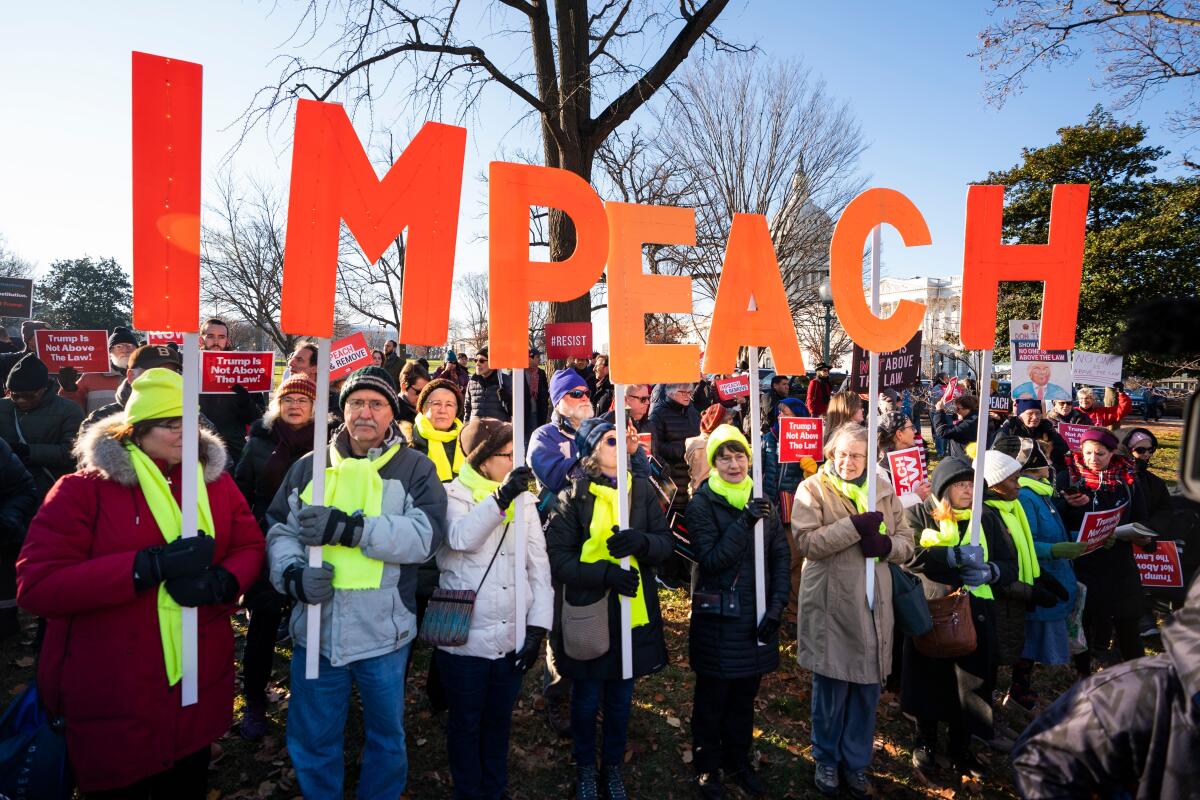In rushing to impeach, Democrats acted like impulsive holiday shoppers

- Share via
Wednesday’s impeachment of President Trump exemplifies the danger of impulse buying during the holiday rush. Despite a record of evidence that is both incomplete and conflicted, the House leadership stuck to its promise to Democratic voters that it would impeach Trump by Christmas.
There is a reason people make impulse purchases — and bring impulse impeachments. A few years ago, professors Juliet Zhu and Grace Chae completed a study of impulse buying and concluded that it increases when shoppers are “surrounded by chaos,” which “ultimately impairs [the] ability to perform other tasks requiring ‘brain’ power.” In other words, holiday crowds in combination with yet another chorus of “White Christmas” could mean you’re at high risk for making bad purchasing decisions.
As one of the four witnesses called before the House Judiciary Committee to discuss the legal issues in the Trump impeachment, I’d say the study explains a lot about Congress’ vote on Wednesday. The crescendo of impeachment noise and the chaos of partisan bickering created a perfect atmosphere for Congress to make a hasty decision.
In my testimony, I criticized four of the possible articles of impeachment for lacking critical elements under the criminal code and case law. I said I thought two articles could legitimately be brought: abuse of power and obstruction of Congress, the two articles the House ultimately decided on. But I strongly encouraged the committee to take more time to develop a record to support the claims. Instead, the committee forged ahead.
I suppose the rush should have been expected. We saw a similar move 21 years ago, almost to the day, with Bill Clinton’s impeachment. Politicians just love to check off their to-do lists at year’s end.
What’s most disturbing is that the Democrats know the current record of evidence falls well short of a viable case for conviction in the Senate. Nevertheless, they opted to move the impeachment by Christmas rather than build a stronger case for a vote in early 2020.
Why? The only explanation that makes any sense to me is that finding by Zhu and Chae: A chaotic atmosphere makes for bad decision-making.
Among the worst decisions made by House Democrats is this: They burned through three months of investigating without even attempting to compel the testimony of key witnesses like national security advisor John Bolton. Instead, they based impeachment charges on a record largely based on the inferences of third-party witnesses.
As a result, they’re left with a record that requires a senator to decide every contested fact in the way least favorable to the president in order to establish an impeachable act. However, there are three direct conversations that directly contradict such a conclusion.
For one thing, the language of Trump’s July call with Ukrainian President Volodymyr Zelensky does not state a clear quid pro quo. You have to infer that his request for a favor implied a penalty if it wasn’t fulfilled.
And then there’s the testimony about Trump’s phone calls with Sen. Ron Johnson (R-Wis.) and U.S. Ambassador to the European Union Gordon Sondland. Both contain express denials of any quid pro quo. One can reasonably question the veracity of such an assertion during the calls, and that’s why the testimony of first-hand witnesses would have been so important. Yet the House made no real effort to hear from key administration figures, including Bolton, Secretary of State Michael R. Pompeo, White House Chief of Staff Mick Mulvaney and Trump counsel Rudolph W. Giuliani.
Not only has the House been curiously passive in seeking to force such testimony; it actually withdrew one of the few subpoenas facing a court ruling in the case of Charles Kupperman, Trump’s former deputy national security advisor. Kupperman was willing to testify and simply wanted court review, but the House strangely withdrew its request that he testify.
House Intelligence Committee Chair Adam B. Schiff has said that requesting courts to compel testimony would take too long. But courts can sometimes work quickly. In a critical case involving Richard Nixon’s impeachment, it took just three months to go from a ruling by the District Court to a final ruling of the Supreme Court. Nixon lost and then resigned.
Given the momentousness of impeachment, taking time to build a strong case is worth some delays. Moreover, courts have already agreed to decide other cases involving the president, including the challenge over whether Trump can be compelled to turn over tax and financial records. That puts the House in the awkward position of impeaching a president for obstruction before the Supreme Court rules on key issues.
I vehemently disagree with the sweeping privilege and immunity claims made by the Trump White House. However, presidents including Barack Obama have stood behind the shield of executive privilege and have gone to court rather than turn over evidence. Both Nixon and Clinton were able to challenge such questions and receive final decisions from the Supreme Court (which ruled against them).
In racing to meet its artificial deadline of impeaching by Christmas, the house submitted a case guaranteed to fail. Rather than wait a couple months to move forward with a greatly enhanced case, the House prefers to grab what it’s got on the shelf and run with it. It is the very profile of the impulse shopper — and the impulse impeacher.
Jonathan Turley is a professor of public interest law at George Washington University. He has testified as a constitutional expert in both the Clinton and the Trump impeachment hearings.
More to Read
A cure for the common opinion
Get thought-provoking perspectives with our weekly newsletter.
You may occasionally receive promotional content from the Los Angeles Times.









